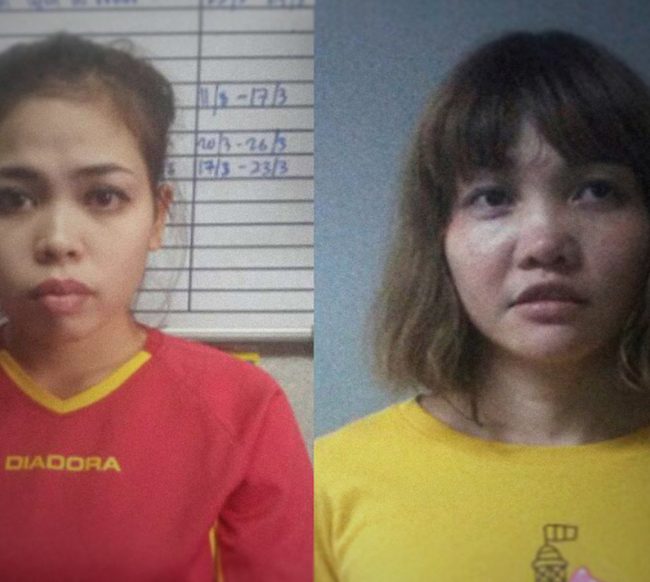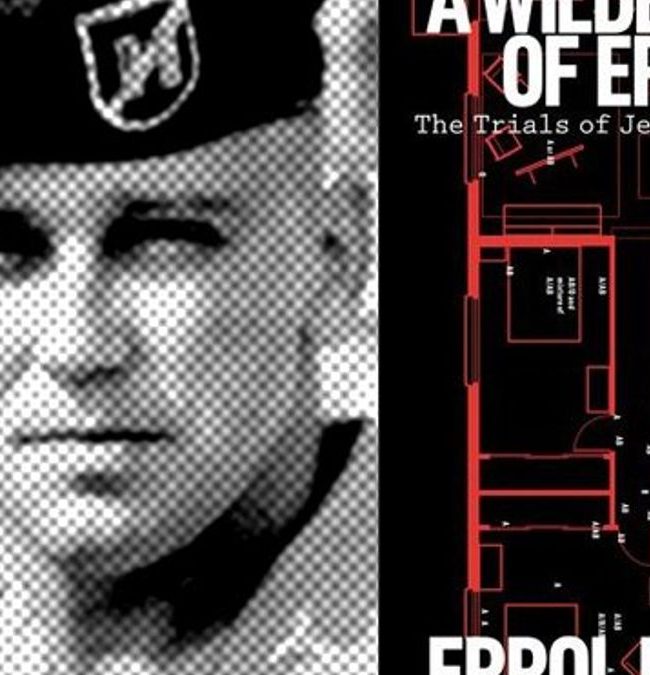A Conversation With Ryan White (ASSASSINS)
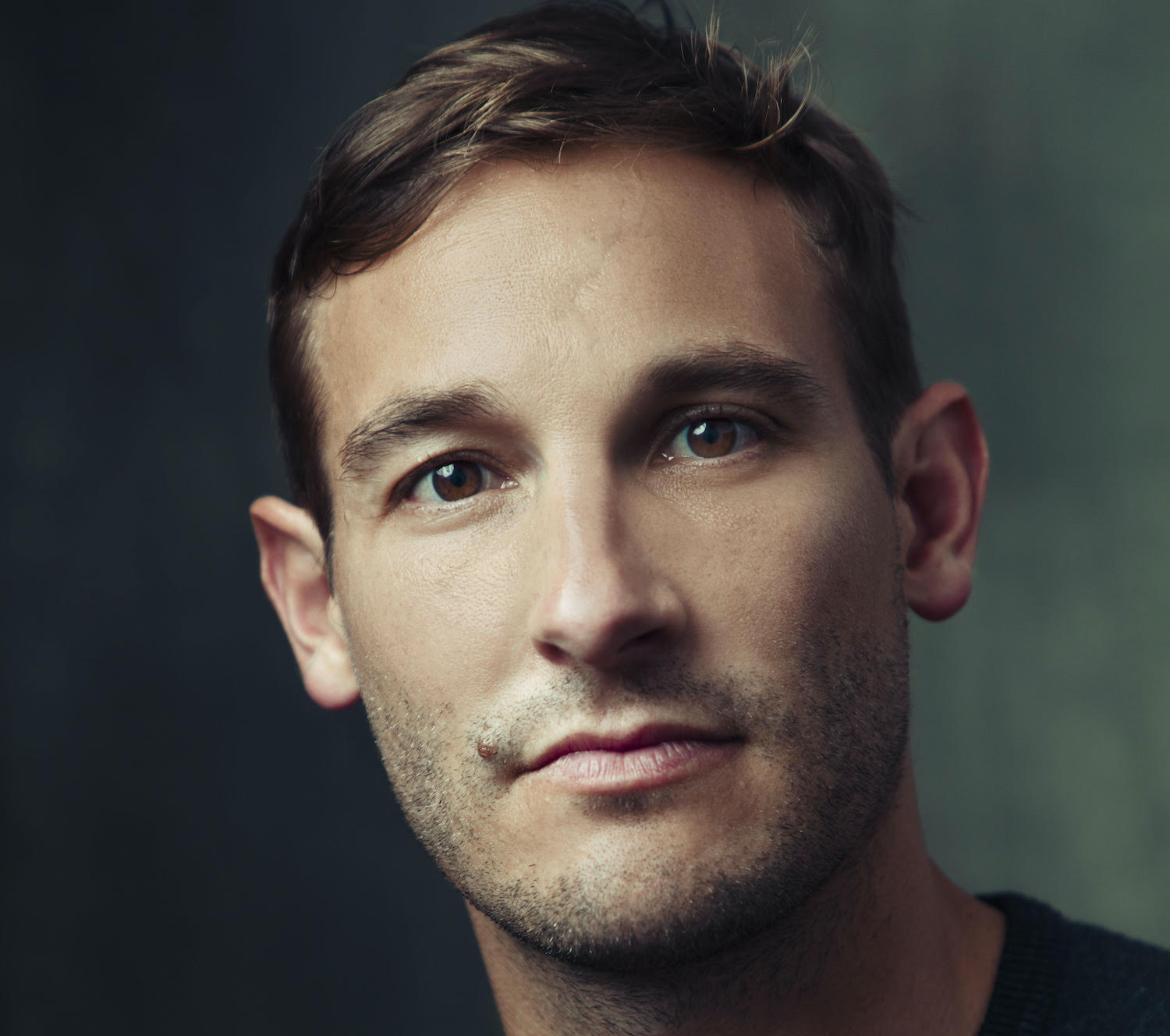
I recently spoke by Zoom with director Ryan White (Ask Dr. Ruth) about his latest documentary, Assassins (which I also reviewed), which tells the too-crazy-to-be-true tale of how North Korea’s Kim Jong-un planned and executed the assassination of his half-brother, Kim Jong-nam. After a long period of grooming, two unwitting young women, one from Indonesia and one from Vietnam, were used as agents of death, approaching their victim in the Kuala Lumpur airport and smearing VX nerve agent on his face. Neither knew each other, and each thought she was part of a “Reality TV” show. Using archival material and interviews, White guides us through this unbelievable story with great skill. Here is a condensed digest of our conversation, edited for length and clarity.
Hammer to Nail: I would like to first ask you about the Netflix series The Keepers, since I live in Baltimore and it takes place there. How did you come to make it? It’s an amazing story, really well made and really well shot.
Ryan White: Well, first of all The Keepers was never supposed to be a series. Like a bunch of my films, actually, it just kind of began as a little family story. My mom is actually from Baltimore. My aunt went to the high school where Sister Cathy taught; she was Sister Cathy’s student. And so this had always been a family story of the murder of the nun. You know, my mom lived like a block from Archbishop Keough High School. And so The Keepers began because, if you remember, there was sort of that mystery character at the center of The Keepers named Jane Doe that everyone had always wondered about. And my aunt and my mom found out who Jane Doe was, I don’t know, probably six or seven years ago now. And it was a very good friend. It was a family friend of ours.
So that’s how it all began, with my aunt and mom saying like, “Oh my God, we’ve always wondered who this woman is. And it ends up, we all know her.” I knew her, already, too. And I flew over to Baltimore to meet her. And I just was so compelled by Jean, the moment I met her, which was a seven-hour meeting at her kitchen table that we left thinking, we’re going to make something about that. It was, I don’t know, 2014. So it was before The Jinx or Making a Murderer and before the series format had exploded for documentaries and true crime. So that wasn’t even a glimmer in our eye. Then that sort of started happening; those series came out while we were making The Keepers. So it kind of snowballed into a series. And thankfully it did, because I actually think that was the best format for The Keepers, but that was never the expectation at the beginning.
HtN: I can’t imagine you trying to fit all that story into a feature-length documentary.
RW: I know! Thank God that format exploded because it is so well-suited for true crime that is full of twists and turns. Although, you know what’s interesting, because we’re talking about Assassins here, is that we had many buyers try to make Assassins into a series and Jess, that’s my producer, she and I were hell-bent on the beginning that the better format for Assassins would be a three-act film, despite the fact that I’m sure our bank accounts would have much more appreciated a series out of it. But we were convinced that it should not be a series. And I stand behind that.
HtN: Fair enough. So, as a good Gen X-er that I am, I grew up really appreciating Dr. Ruth Westheimer. I think it was the first time I heard sex talked about so explicitly in media. So I really appreciated your documentary, Ask Dr. Ruth. How did you come to make that film?
RW: Well, I made Ask Dr. Ruth and Assassins at the same time, which I often do. I was coming out of The Keepers, and The Keepers is so dark; such a depressing world. So bleak. There’s not a ton of hope at the end of it. So Dr. Ruth came into my life right as I was ending The Keepers and was such a welcome palate cleanser. I didn’t know her personally, but I knew a producer who did, who pitched the idea to me. He didn’t even pitch the idea to me. He said, would you want to meet her? And nobody would ever say no to meeting Dr. Ruth, right? Her show was such a rite of passage for everyone now that I’ve watched thousands of people interact with her on the streets all over the world. People love just getting a moment with her.
And I was no different. I had a dinner with her in New York and just fell in love. And I fell in love with her and her story, which I didn’t know a lot about, but I also think I desperately needed something like that, tonally, coming out of The Keepers. And I know my team did, too, needed something that was just more hopeful and fun. And so I started making that film and then I got the inevitable itch to go back into a world of darkness and danger and crime. And so I started making Assassins, and Dr. Ruth hated that I was making this film. She was by that point my surrogate grandmother. And so the idea that I was in these underbellies of Asia covering the North Korean regime, she was having nightmares about my safety. She was constantly calling me while I was in Asia making sure I was being safe, and I was constantly lying to her telling her I was. So she’s probably more excited than anyone that Assassins is finally out in the world now and I’m not making it anymore.
HtN: Before I ask you the specifics of how you started to make Assassins, there’s another bridge between it and The Keepers, which is your cinematographer, John Benam. How did you meet this Baltimore-based cinematographer? The Keepers was the first time you’d worked together, right?
RW: That was our first time working together, yes. We were looking for a local DP [Director of Photography] in Baltimore because we were spending so much time there. I mean, Jess and I spent half out of every month there for almost three years, I think. So, I shoot, myself, as well. I like to hold a camera, but I would never claim to be a DP. And so I wanted to be shooting second camera on The Keepers. I didn’t want that to be taking over my life, which it has on some previous films when I’m shooting them, myself, for better or worse. Sometimes I think that’s what I have to do. And so we met John, I can’t even remember, through people in the film industry. But the biggest blessing on The Keepers was finding John.
John’s not only so talented in the way he shoots, but he was the perfect personality fit for The Keepers because it was so dark and traumatic, and we were asking people to bare their souls about the worst parts of their entire life. And we quickly realized that he has an empathy to him and a sensitivity that lent themselves really well to The Keepers. I mean, he’s still close with all of the women in The Keepers because John lives in Baltimore, as well, and sees them more often than I do. And they love him like a family member. He’s also very good at run-and-gun projects. John comes from nature cinematography. He’s done so many amazing nature films for National Geographic and other networks that he has that ability to be ready to pivot really fast.
So, I always kind of divide my documentaries in two when it comes to cinematography. Ones that I can plan out a lot more are very interview-based where the DP and I will have a lot of time to plan. And then there are the other ones that are totally unpredictable, and you need somebody who can roll with that. And so John was the obvious, perfect person to go with for Assassins, because it could not have been more run-and-gun. I mean, that film is basically me and John jumping in and out of taxis or shooting undercover at sex-club bars, wandering the underbelly of Kuala Lumpur at night. Within The Keepers, we did a lot of that type of filming. So I already knew the way we work together in that way, and that he would nail this project, too, which I think he did.
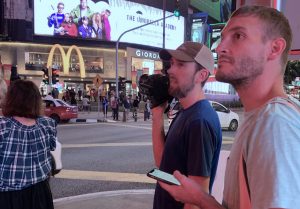
DP John Benam and director Ryan White
HtN: This is quite an involved story, and deals with some pretty amazing footage and investigations. How did you ever discover this tale and then decide to make a film about the assassination of Kim Jong-nam?
RW: Well, I did not seek this out. This was definitely not a story that I remembered and desperately wanted to tell. And it also obviously wasn’t a story that my family handed to me like many have in the past. I think we’ve made three films that came from family stories. I think, like most Americans, I remembered it as a headline. I remembered that Kim Jong-un’s brother had been assassinated publicly in an airport with a chemical weapon and this crazy detail that it had been two female assassins. And that was sort of my memory. And that’s because if you look back at this historically, this assassination happened in February of 2017. Trump had just been inaugurated in the weeks prior to this assassination. There was no real estate in the U.S. on news or media for other stories, even if those other stories were probably the biggest political assassination of our lifetime. Definitely the most spectacular one, at least.
And so late 2017, The Keepers got very, very popular, very fast, and got us a ton of attention in the film industry and a ton of attention from people who were telling investigative stories. And so, a journalist named Doug Bock Clark wrote an article in GQ magazine, late 2017, that was a deep-dive investigative piece into this assassination. I had not read it, but it was wildly popular, apparently. And he approached us with his story saying, “All of these filmmakers are trying to option this article I wrote. I saw The Keepers. I’d love to talk to you guys about it. Would you be interested in jumping on the phone?”
So we then read the article, of course. That was the first time I was privy to this unbelievable story about Siti Aisyah, the Indonesian woman, where she confessed that she had assassinated someone, but that she was claiming she did it unwittingly and that she thought she had been on a Japanese reality show. The article was bananas. And our conversation with him was very convincing to us that he hadn’t exaggerated his story in any way. And a few weeks later, as I often do in my impulsive ways, I was on a flight with him to Malaysia to explore. And John came with us. It was the three of us. And that’s where it all began.
Being on the ground in Malaysia, with Doug introducing us to all of his sources, with the wild possibility that these women could be innocent, was so intriguing. The idea that that could be the basis for a defense that someone would actually say, “I assassinated someone, but I thought I was on a reality show, it’s not my fault, don’t put me in jail,” was too crazy not to continue to pursue. And that just kept us going back and going back and going back with that constant question of, “Who are these women? If we can answer this question for ourselves, then I think the audience is going to enjoy finding out that answer as well.”
HtN: I think this is one of those stories that if it were a scripted drama, people might think you were being unbelievable with the fact that they didn’t know what they were doing and they thought they were on a reality TV show. It is just so absurd, and yet true. Now, you talked about Dr. Ruth being worried about you filming this. Did you ever actually feel threatened or in danger, maybe threatened by shadowy North Korean agents? Because Kim Jong-un does not mess around. Did you ever feel like you were in danger?
RW: I mean, the simple answer is yes. We felt uncomfortable the entire time we were making this film. Kim Jong-nam had been assassinated all over camera, publicly, in an airport. So I can’t ever say that in the last three years I haven’t been walking through airports just waiting for someone to come up behind me and play peek-a-boo. So we felt the danger of it every day. And I don’t know how valid a lot of that is. Some of it is definitely valid and there are firm examples of times we were told to back off, or we had people pretending to be people online that they actually weren’t, or we had to have the FBI consult on this film for cybersecurity reasons because of the Sony hack that preceded it. But then you also don’t know what’s paranoia and what’s not.
I was working with journalists who cover this North Korean beat all the time. And so they were teaching me how you navigate those waters. And those are scary things, such as, at lunch meetings, taking your battery out of your cell phone or putting it in an impenetrable pack so that you can have certain conversations, or finding out from these journalists that intelligence agencies are tracking our film and had been reaching out to them. So there was a lot of feeling of danger, and I never knew where to draw the line between validity and paranoia. But either way, that’s not a fun way to live. And so I’m very happy that the film is finished. I have to say, though, as much as we felt in danger, I realized that the people that we were following were the ones that were actually in danger. I mean, obviously the two women who are my two main characters were in danger this entire time from the moment they met the North Koreans. But they were now on death row, in jail, in solitary confinement. I couldn’t access them.
And the only reason we’re able to kind of pull the curtain back and tell you what actually went down is because both women’s defense teams completely opened up their files to us and allowed us to tell that story. The Malaysian government was out to convict them, for sure. So it was these legal teams that were the only people getting in front of microphones or shouting from the rooftops that North Korea did this. They were identifying the North Korean operatives. They were naming them. They were showing them on camera. And so I think they’re the real ones who were in danger. And so it kind of felt like an obligation; people were really putting their neck on the lines. The least we can do is document the danger they’re putting themselves in to get the truth out.
HtN: So now that you’ve spent all these years telling the story and being immersed in it, do you have a sense of how the Trump administration’s normalizing of Kim Jong-un has affected the geopolitical order of that region?
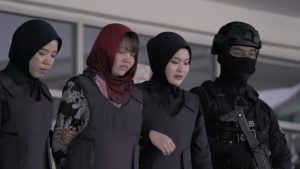
A still from ASSASSINS
RW: Yeah. I mean, I never expected my film to be so geopolitical in its scope. We were making a character film and I think that’s what it is, in the end, about these two women. But inevitably we had to show the big picture, the web that surrounded these two women. And that goes to the highest echelons of international relations and geopolitics. I didn’t see the direction that the film was going. But what I started to learn, and this was especially from Anna Fifield, who’s the journalist who’s in our film, who literally wrote the book about Kim Jong-un, called The Great Successor, last year, which is an amazing book that was so eye-opening for me in the sense that I feel like, especially in American society, we have come to caricature Kim Jong-un in a way where he’s always a punchline.
I mean, the most prime example of that is The Interview, the Sony film that kind of treated him as a man-baby and then got hacked because of it. Or Team America, with Kim Jong-il. It’s become common vernacular, cultural vernacular, to make fun of this regime and laugh at them. And what Anna’s book really did for me was take Kim Jong-un very seriously as a threat and as someone who was very strategically consolidating power. He took over when he was 25 and that was total nepotism. But everyone expected him to fail and he did not. And that’s not just purely because of luck. That’s because of strategy.
And so what I started to realize was this assassination that I was following played a key role in that. A huge role. Not even just in taking out one of his main rivals, but also sending a shiver down the spine of all of these foreign governments because he had had someone assassinated publicly in an international country, all over camera, and by two people claiming they didn’t even know what they were doing. And so this assassination played a key role in that consolidation of power. And then there were the next steps, with the nuclear missile program that he was building quite successfully, in the end, even though we all laughed at that as well while it was happening.
And then followed the role of what Anna terms the international statesman, and the fact that Kim Jong-un has been able to have his uncle assassinated, have his brother or uncle executed, have his brother assassinated, has committed all of these human rights abuses in his country and yet not even receive a slap on the wrist for these crimes, to be legitimized by foreign governments. And Donald Trump isn’t the only one. We have a scene at the end of our film in the wake of this assassination where he’s starting to meet with a lot of the most powerful world leaders on a stage that gives him that credibility.
We were very narrowly focused on the women, but we always had to be looking at the macro because it was this international web of foreign governments, including the Malaysian government, including the Vietnamese government, Indonesian and American governments, which we go into with Kim Jong-nam being a CIA source. And the lives of these women, just two regular women, hung in the balance of all of this massive web of the highest echelons of international relations. And that was so fascinating to me as a storyteller. How did these women end up where their life hinges on these huge geopolitical factors? So it was always fun in the editing room to figure out the macro and micro and try not to sacrifice one too much for the other one.
HtN: Well, I wish you the best of luck with it. Thanks for chatting with me and thanks for making the film. It’s quite a work.
RW: Thank you. Thanks for chatting.
– Christopher Llewellyn Reed (@ChrisReedFilm)








